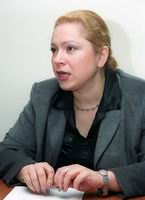The Serbian Investment and Export Promotion Agency (SIEPA) will be busy over the next six months trying to help the state kick-start the economy and create conditions to attract foreign investors, said SIEPA Director Jasna Matic
- Serbia
Get to know Serbia
- Citizens
Culture and science
Health services
Pension and disability insurance
- Business
Employment
Economy
- Media
- Government
- Contact
Keep in touch
Contact form
Back
Keepin touch
Whether you have a question, comment, suggestion or any problem in the purview of the government, send us your message and we will try to respond as soon as possible. If your problem is not in our purview, we will forward your message to the relevant institution.
Q:
A:
SIEPA director urges state to kick-start economy, attract foreign investors
Belgrade,
15 April 2004
SIEPA, which operated as part of the Ministry of International Economic Relations, faced a number of working problems in the past because it was set up by a decree, rather than a law, said Matic, noting that SIEPA will bolster its efficiency once it becomes a government agency.
According to Matic, a number of foreign investors spent years looking for a suitable land parcel or facility in Serbia, and ultimately shelved their plans to invest in the country. It took US Ball Corporation two years to secure the necessary conditions to build a plant in Serbia, she said, noting that France’s Cora abandoned its plans to open a hypermarket in the country after it spent two years looking for the right location.
SIEPA will seek to encourage companies that have already established presence in Serbia to increase their investment volume, Matic went on to say, adding that the agency will also continue to cooperate with foreign investor associations, including AmCham and the business clubs of Japan, Germany, Italy and Slovenia.
A rise in the investment level of foreign companies already operating in Serbia would send a positive signal to other investors abroad who still see Serbia as a high investment risk country, the SIEPA Director explained.
At the same time, SIEPA will make efforts to promote Serbia’s agriculture, food, automotive, leather and footwear industries to prospective new investors, Matic added.
Calling on the government to pass a bill on foreign investment agency as part of efforts to create an investment-friendly environment in the country, Matic recalled that the European Agency for Reconstruction (EAR) and SIEPA launched a €1.1 million project early this year to help local companies fund export programmes. Each firm included in the project will be entitled for up to €50,000 and will have to secure 50 percent of the necessary funding from its own resources.
She went on to urge the state to revive the economy and stop recession, stressing that the only way to revamp industrial production is to attract foreign investors.
Serbia’s legislation does not allow foreign investors to purchase land in the country, said Matic, who also noted that investors have suggested a number of measures to improve Serbia’s investment climate, such as issuing shares in the hard currency and clarifying domestic laws and regulations.
According to Matic, a number of foreign investors spent years looking for a suitable land parcel or facility in Serbia, and ultimately shelved their plans to invest in the country. It took US Ball Corporation two years to secure the necessary conditions to build a plant in Serbia, she said, noting that France’s Cora abandoned its plans to open a hypermarket in the country after it spent two years looking for the right location.
SIEPA will seek to encourage companies that have already established presence in Serbia to increase their investment volume, Matic went on to say, adding that the agency will also continue to cooperate with foreign investor associations, including AmCham and the business clubs of Japan, Germany, Italy and Slovenia.
A rise in the investment level of foreign companies already operating in Serbia would send a positive signal to other investors abroad who still see Serbia as a high investment risk country, the SIEPA Director explained.
At the same time, SIEPA will make efforts to promote Serbia’s agriculture, food, automotive, leather and footwear industries to prospective new investors, Matic added.
Calling on the government to pass a bill on foreign investment agency as part of efforts to create an investment-friendly environment in the country, Matic recalled that the European Agency for Reconstruction (EAR) and SIEPA launched a €1.1 million project early this year to help local companies fund export programmes. Each firm included in the project will be entitled for up to €50,000 and will have to secure 50 percent of the necessary funding from its own resources.
She went on to urge the state to revive the economy and stop recession, stressing that the only way to revamp industrial production is to attract foreign investors.
Serbia’s legislation does not allow foreign investors to purchase land in the country, said Matic, who also noted that investors have suggested a number of measures to improve Serbia’s investment climate, such as issuing shares in the hard currency and clarifying domestic laws and regulations.
-
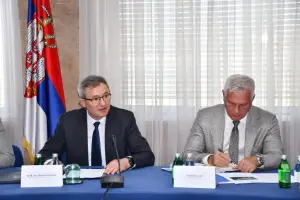 Belgrade, 27 October 2025
Belgrade, 27 October 2025Construction of Selova dam of vital importance for southeast Serbia
-
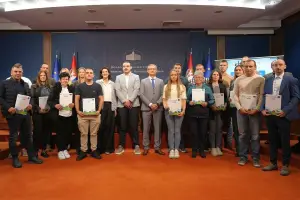 Belgrade, 22 October 2025
Belgrade, 22 October 2025First 19 resolutions awarded under IPARD III for procurement of new tractors
-
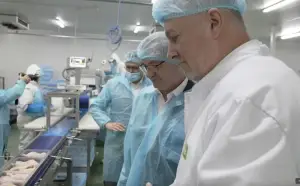 Šid, 21 October 2025
Šid, 21 October 2025Superior Foods example of successful Serbia-Hungary cooperation
-
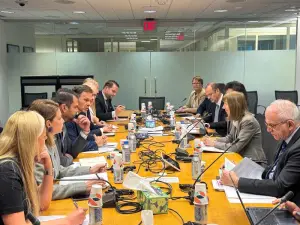 Belgrade/Washington, 17 October 2025
Belgrade/Washington, 17 October 2025Confirmation of Serbia’s position as attractive investment destination
-
 Belgrade/Washington, 16 October 2025
Belgrade/Washington, 16 October 2025Serbian economy maintains stability amid global challenges
-
 Sombor, 14 October 2025
Sombor, 14 October 2025Agriculture one of major pillars of bilateral cooperation with Italy
-
 Belgrade, 13 October 2025
Belgrade, 13 October 2025First IPARD III resolutions on support to farmers presented
-
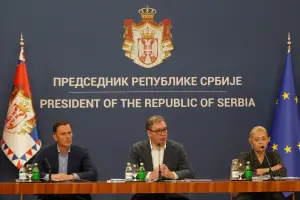 Belgrade, 21 September 2025
Belgrade, 21 September 2025Solution for legalisation of 4.8 million properties by year’s end
-
 Belgrade, 19 September 2025
Belgrade, 19 September 2025Strong potential for Italian investments in Serbia’s processing sector
-
 Belgrade, 17 September 2025
Belgrade, 17 September 2025Serbia committed to building strong economic ties with Russia

